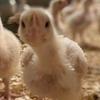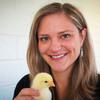Poultry welfare in the hatchery
Published: February 5, 2021
Source : Dr. Leonie Jacobs, Virginia Tech. Reviewers: Dr. Shawna Weimer, University of Maryland; Dr. Prafulla Regmi, North Carolina State University; Dr. Marisa Erasmus, Purdue University.

Early feeding can improve broiler performance and welfare
The first experiences of a day-old chick play an important role for the development and performance of chicks later in life. Especially for broilers, one or two days make up a large portion of their relatively short lifespan.
Day-old chicks can actually be up to three days old due to the time it takes for all chicks to hatch within the same hatcher. These modern genetic lines may use up their yolk sac faster than originally thought, which was up to 72 hours. Research has found beneficial impacts of providing chicks with feed and water immediately after hatch, and some commercial systems have been developed to provide in-hatcher feed and water.
Studies have found increased yolk uptake, improved gut quality, and higher processing weights compared to chicks fed after arrival at the farm. Broiler chickens have a greater appetite compared to other chicken strains, and early feeding may provide an additional benefit: fulfilling the birds’ motivation to eat. This can avoid birds becoming frustrated because of the delayed feed access.

Male chick maceration and gas culling banned in France, with other European countries to follow
The French department of Agriculture has banned the use of chick macerators and gassing for male laying-line chicks after 2021. In Germany, a similar ban is on the horizon.
Besides the potential welfare concern with macerating and gassing chicks, it is also deemed unsustainable and unpalatable for consumers. The culling methods are used industry-wide, and instead, the hatcheries will need to use technology to determine the sex in-ovo. Multiple methodologies are under development, including the use of lasers, and hormones in egg fluids. When considering animal welfare, early timing of in-ovo sex determination is key.
Alternatively, males could be grown until the end of the hens’ pullet phase. This practice is currently applied by a Dutch organization which markets the male meat product as ‘rooster burgers’ and 'meat balls' at a single supermarket chain.

Things to incubate on
Noise pollution during hatchery processing: not only a concern for human welfare?
Hatching and other processes at the hatchery can be quite impactful for newly hatched chicks. The processing often involves large sorting equipment, which produce noise pollution.
For humans, this can range from an inconvenience to permanent hearing damage. Noise exposure can induce acute stress in older broilers, when noise levels reach 80 dB. In addition, continuous noise has been shown to reduce egg production and growth, and increase blood pressure in other cases.
To our knowledge, no studies have looked at the impact of noise exposure in the hatchery, but negative effects are deemed possible.
This article was originally published on Poultry Extension Collaborative (PEC) and it is reproduced here with permission from the authors.
Related topics:
Authors:




Show more
Recommend
Comment
Share

Would you like to discuss another topic? Create a new post to engage with experts in the community.




















